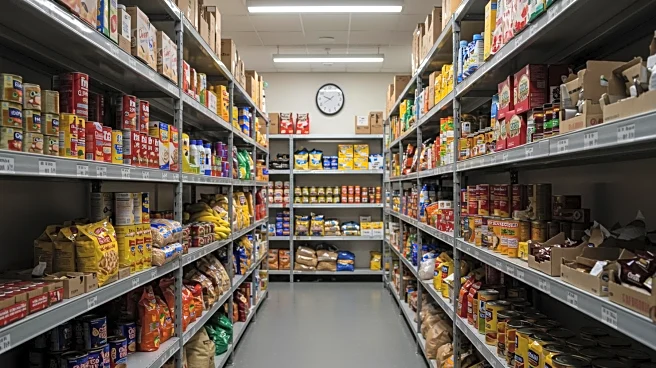What's Happening?
Leanne McDonald, founder of Simple Acts of Kindness, a support group in Wolverhampton, has observed a growing number of employed individuals, including teachers and nursing staff, seeking assistance from food banks due to the ongoing cost of living crisis. The group, established during the pandemic, provides essential household items and acts as a signpost for additional services to families in need across Wolverhampton, Birmingham, and the Black Country. Despite being employed full-time, many individuals are struggling to afford basic necessities, highlighting the financial strain on skilled workers. The support group itself faces challenges, with volunteer numbers dwindling as individuals take on extra paid work to manage their own financial difficulties.
Why It's Important?
The situation underscores the broader economic challenges faced by working individuals in the UK, where rising living costs are impacting even those with stable employment. This trend could have significant implications for public policy and social services, as more people require assistance despite being employed. The reliance on food banks by skilled workers, such as teachers and nurses, raises concerns about wage adequacy and the sustainability of essential services. The decrease in volunteer numbers further stresses the capacity of support groups to meet growing demands, potentially affecting the availability of aid to those in need.
What's Next?
Simple Acts of Kindness is organizing a fundraising event at the Golden Bar and Grill in Wolverhampton on August 30 to help cover operational costs. This initiative aims to bolster the group's resources to continue providing support amidst increasing demand. Additionally, the ongoing economic pressures may prompt further discussions among policymakers and community leaders about addressing wage disparities and enhancing support systems for low-income households.
Beyond the Headlines
The reliance on food banks by employed individuals highlights deeper systemic issues within the economy, such as wage stagnation and the rising cost of living. This situation may lead to increased advocacy for policy changes aimed at improving wage structures and reducing living expenses. Furthermore, the strain on support groups could catalyze community-driven solutions and partnerships to enhance resource distribution and support networks.











